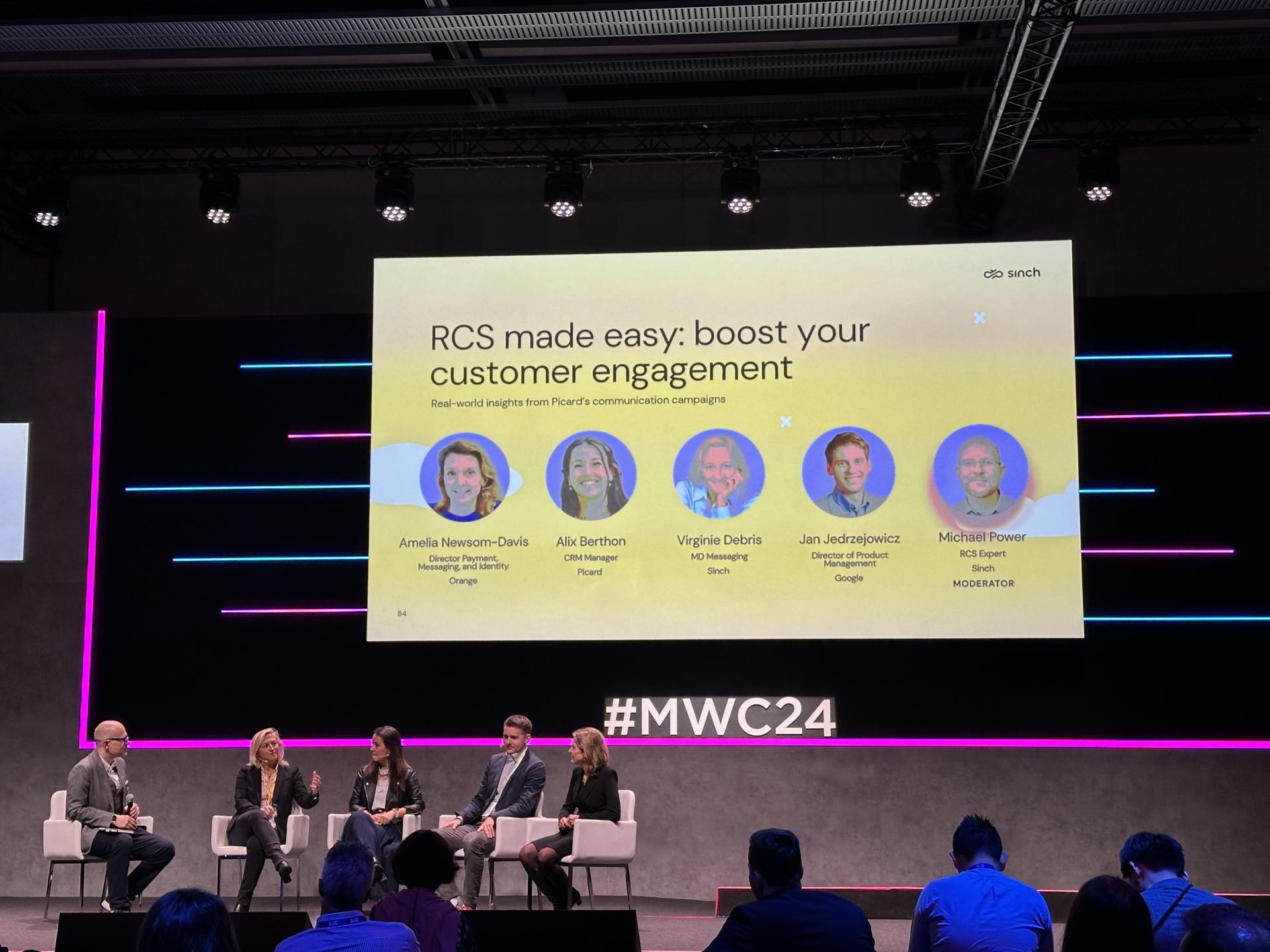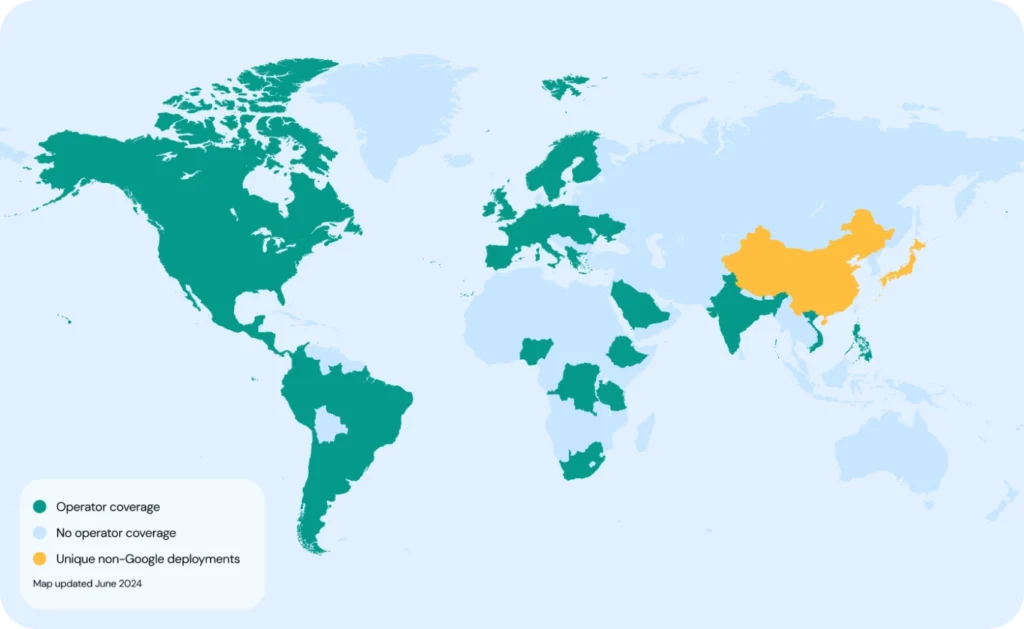Insights
Shaping the future of RCS for business messaging

For over two decades, SMS has been a trusted, widely available method for brands to connect with their customers. But recently, the landscape has been evolving, with Rich Communication Services (RCS) offering the promise of engaging, dynamic messaging capabilities to businesses.
Now, brands, aggregators, operators, and Google are coming together to drive the adoption of RCS business messaging forward, opening new possibilities for brands and customers to interact. In this piece, we explore how RCS is gaining momentum in the realm of business messaging.
These insights are drawn from a presentation at the Mobile Ecosystem Forum (MEF)’s “Future of Mobile Summit 2024” during Mobile World Congress (MWC) Barcelona.

Current state of the global RCS market
Despite being new for many brands, RCS is already making big waves in messaging.
We saw this especially around Black Friday 2023, when RCS messaging for business use skyrocketed. Brands sent a whopping 25,000x more RCS messages in November 2023 than they did in February 2022.
Some mobile operators are also seeing this exponential growth, with brands using RCS more and more to send more engaging campaigns.
“[What] I’m told by Google is that France is one of the leading RCS markets in Europe. We’ve seen growth of about 400% in 2023 versus the previous year, so we’re looking at about 100 brands using RCS business messaging. It’s growing fast, [with] lots of recurrence.”
– Amelia Newsom-Davis, Director of Payment, Messaging, and Identity at Orange
Research and Markets also predicts the global RCS market will reach US $19.48 billion by 2028, up from US $8.37 billion in 2023. That’s a big leap, showing that businesses are eager to invest in RCS early on, especially after Apple’s announcement that they’ll support RCS in the iOS 18 update in fall 2024.

While this growth is remarkable, we can only expect it to continue with innovative brands like Picard starting to experiment more with the channel.
Enhanced engagement with RCS business messaging: Picard’s journey
In 2022, Picard earned the title of France’s favorite food retailer, and the company operates in 18 countries. For the past few years, their holiday objectives have been clear: drive website traffic, provide unique content to boost customer loyalty, and increase engagement during the crucial Christmas season, when 25% of their annual sales occur.
They chose RCS for its branded, verified messages to help enhance trust and security, and engage their security-conscious customer base.
For their Christmas 2022 campaign, Picard fully embraced RCS’s capabilities. They used an AI chatbot and personalized RCS messages to help customers choose the perfect menu based on their cooking skill level or preferences. Enriched with GIFs and extended character limits, these messages saw a 3x higher click-through rate than SMS and 42% more engagement.
Watch the video to learn how Picard provided personalized customer service experiences during the holiday season using RCS messaging.
In 2023, Picard continued to use RCS for their Christmas sales, achieving a 70% read rate and a staggering 18% click-through rate – which was 2.4x higher than traditional SMS.
What’s more, RCS’s SMS fallback ensures that even Picard’s audience without RCS-compatible devices could engage with the messages, ensuring broader reach and impact.
As more brands adopt RCS, we can only expect to see other exciting and innovative campaigns in the future.
How RCS can redefine business messaging
With brands like Picard already using RCS and Apple support expected this year, we can expect to soon have feature-rich communication experiences on all devices. Though we don’t have full details, it offers exciting possibilities for businesses.
“We’re soon going to find ourselves in a situation where basically every smartphone in the world comes with RCS out of the box, working on day one. A few years ago, that would’ve felt unthinkable, and that just creates a lot of opportunity and potential.”
-Jan Jedrzejowicz, Director of Product Management at Google Messages
Here’s what else RCS business messaging can bring to the table when it comes to customer engagement and scalability.
Enhanced trust between brands and customers
In the future, RCS is set to reshape how brands and customers interact. With its trusted carrier ecosystem, RCS offers a level of reliability and security that consumers value more and more – perhaps setting a new standard for business messaging.
Consumers trust RCS because it operates within their mobile inbox, much like SMS. As more brands embrace RCS, they’ll need to maintain this trust by ensuring clean, reputable messaging practices that aren’t susceptible to issues like smishing.
“In reality, consumers trust operators more than anyone else… but the operators have all our information, and we trust them. For example, my parents use SMS because they trust that environment today… [and] in turn they naturally will adopt RCS because it’s in the inbox.”
-Virginie Debris, Managing Director of Messaging, Sinch
Ultimately, long-term success for RCS business messaging will rely on everyone in the ecosystem working to maintain it as a clean, trusted, and highly reputable channel – while also making sure that every RCS message adds value to the end user.
Rich, interactive P2A messaging
RCS business messaging is primarily known for its application-to-person (A2P) messaging capabilities, but the real game-changer could be if and when RCS expands to have person-to-application (P2A) messaging capabilities.
This could be as simple as a user-friendly “click-to-conversation” feature directly within a user’s native messaging app. Users would simply click a button to engage in a real-time RCS chat with a brand, where they could share photos, send signed documents, and more, right within their phone’s native messaging app.
“Imagine you’re on your phone on a help page and want to contact a brand’s customer service. You could just click on a little button with an RCS or chat logo and you could go directly through to have a direct conversation.”
-Amelia Newsom-Davis, Director of Payment, Messaging, and Identity at Orange
This functionality could totally redefine the messaging experience. How brands, operators, aggregators, and Google collaborate over the next year will be essential in shaping the future of P2A messaging in a meaningful way.
Scalable AI integration
RCS business messaging has the potential to be even more effective as brands begin to bring in conversational AI like chatbots, advanced personalization tools, and more.
“Brands are always keen to innovate. What gets me very excited is just hearing so much enthusiasm from enterprises wanting to adopt AI for achieving and furthering business goals. RCS/RBM business messaging is no-brainer place to start.”
-Jan Jedrzejowicz, Director of Product Management, Google Messages
As they formulate their AI strategies, enterprises will be thinking about how they can integrate AI to work with internal processes to streamline operations. And those supporting them – from mobile operators to CPaaS providers – should be proactively positioning RCS as a fundamental component for customer engagement.
Interested in learning more about AI? Check out our recap of another session at MWC Barcelona focusing on responsible AI adoption for enterprises.
Embracing the future together
Looking ahead, RCS has the potential to revolutionize how brands and customers interact. Its trusted carrier ecosystem and upcoming support from Apple promise reliability, security, and widespread use that will completely redefine business messaging.
This transformation, though, hinges on collaborative efforts among various stakeholders, like brands, operators, aggregators, and Google. By working together, we can ensure that RCS builds trust, mitigates spam, and lives up to its potential for business messaging.
Want to learn more about the impact that RCS can make on your business? Download our free guide, “How to make a compelling business case for RCS,” which will walk you through everything you need to make the case to bring RCS into your organization.
Or, if you just want to explore more about the potential of RCS, check out our RCS messaging insights hub for the latest and greatest in RCS messaging!





